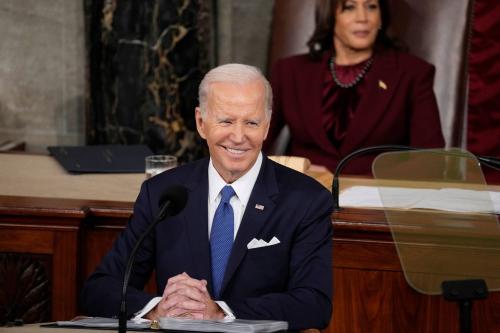On the second anniversary of the No Child Left Behind Act (NCLB), the law is coming under intense criticism. Education apparently will be just as important in the 2004 presidential campaign as it was in 2000. It will also be an issue debated by Democratic and Republican candidates for Congress. The three main criticisms of NCLB are that it is inadequately funded, unfairly holds schools accountable for student performance, and requires an onerous amount of student testing. How will each of these arguments play out with the electorate?
Funding
Democrats complain that the Bush administration’s funding of NCLB falls short of the amount Congress authorized. The shortfall is $6 billion to $7 billion. No one believes that amount of money can make a decisive difference in improving America’s schools. That said, there is no doubt states and local districts could use more funding—whatever its source—especially for bringing all teachers up to the standards of “high quality” mandated by NCLB. Strained state budgets have made voters wary that schools are being shortchanged. Even some Republican governors have complained that NCLB issues mandates without the funding required to fulfill them. Advantage: Democrats.
Accountability
Very few people think that traditional approaches to accountability mechanisms worked very well. Every year, hundreds if not thousands of schools managed to slip by without teaching kids how to read, let alone teaching them history, science, or mathematics. Should schools be held accountable based on what they have taught students or on other grounds, such as keeping parents happy, holding down student suspensions and expulsions (even if discipline suffers as a result), or school principals ingratiating themselves with district administrators? Taxpayers spend about $500 billion each year on K-12 education. They want to see results. Advantage: Republicans.
Testing
Should students be tested on assessments reflecting the skills and knowledge that the public considers important? Or should they be evaluated on criteria set by individual teachers and school principals, with each school going its own way in measuring what students learn? In the past, minority and poor kids paid a huge price for the lack of data on school achievement. No Child Left Behind requires an annual test in grades three through eight and public release of the results. Polls are clear that neither parents nor the general public considers annual testing onerous. Advantage: Republicans.
The NCLB is not without problems. It needs tinkering. The revisions that would do the most good are technical in nature. They do not lend themselves to political sound bites, and, therefore, we probably won’t hear about them in the fall campaigns. Among the most pressing problems are figuring out how the performance of subgroups of students (especially minorities and poor students) can be fairly incorporated into accountability systems; making sure that provisions requiring schools to make adequate yearly progress (AYP) are reliable, especially with small schools; and coming up with ways to insure that all teachers are highly qualified.
The needs of gifted, high achieving youngsters are ignored by NCLB. The law lacks any form of student accountability, a serious omission if you believe students respond to incentives just as educators do. Rewards and sanctions are surely as helpful in encouraging students to learn a lot as they are in encouraging schools to teach well.



Commentary
Op-edNo Child Left Behind and the 2004 Campaign
January 8, 2004